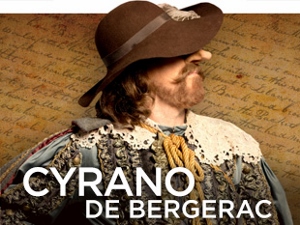PANACHE, YES’”PASSION, LESS
If a story’s strong enough, you just need to rekindle the plot. Edmond Rostand’s timeless love story celebrates the one-sided love between the famous 17th century  swordsman-poet disfigured with a humongous schnoz and Roxane, his beautiful cousin. Roxane is initially infatuated with Christian, her younger, handsome suitor who nonetheless can’t win her without Cyrano’s hidden eloquence. Cyrano’s unrequited love, alas, is only revealed–but never confessed to its subject–when it’s too late. Only 14 years later does Roxane discover that Christian’s good looks fatally distracted her from knowing the worth of Cyrano’s life-long adoration. Together, Cyrano, Christian and Roxane create the most powerful literary three-way in dramatic literature.
swordsman-poet disfigured with a humongous schnoz and Roxane, his beautiful cousin. Roxane is initially infatuated with Christian, her younger, handsome suitor who nonetheless can’t win her without Cyrano’s hidden eloquence. Cyrano’s unrequited love, alas, is only revealed–but never confessed to its subject–when it’s too late. Only 14 years later does Roxane discover that Christian’s good looks fatally distracted her from knowing the worth of Cyrano’s life-long adoration. Together, Cyrano, Christian and Roxane create the most powerful literary three-way in dramatic literature.
Indeed, shortly after Oscar Wilde coined the phrase “the love that dare not speak its name,” Edmond Rostand penned this drama on that theme. A portrait of silent passion, Cyrano de Bergerac shows how unspoken love hurts just as much as 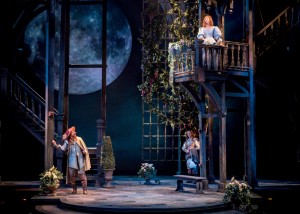 unrequited love.
unrequited love.
Rostand’s deservedly popular 1897 work celebrates the gallant swordsman and wordsmith, his vaunting bravado and his selfless devotion. “One of those rare animals who have opted to be free,” as his noble enemy De Guiche describes him, Cyrano is ferociously independent, a sworn enemy to cant (“I’m too proud to be a parasite”). His one undefeated enemy is himself: Helpless with love for Roxane, he fears his ugliness–to wit, his notoriously large nose–makes him unworthy to receive a woman’s love or confess his own.
So Cyrano becomes a passionate go-between for Christian, Roxane’s poorly chosen lover, a hot-blooded, handsome and bashfully inarticulate Gascon warrior. In the most lyrical scene in an unashamedly romantic drama, Cyrano woos Roxane in the 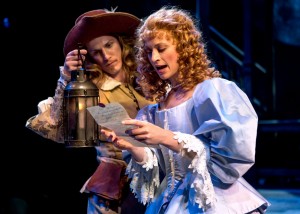 dark while, pouring out borrowed words, Christian reaps the rewards of another man’s ardor. Only later–when it’s too late for joy but not for regret–does Cyrano discover how much he was loved for his beautiful soul.
dark while, pouring out borrowed words, Christian reaps the rewards of another man’s ardor. Only later–when it’s too late for joy but not for regret–does Cyrano discover how much he was loved for his beautiful soul.
At its heart this is a fairy tale, much like Beauty and the Beast, except that Cyrano expects no redemption from his lifelong curse and, of course, he’s done nothing to deserve it. Allergic to rank and skeptical of fame, all this rebel owns is his “scrubbed liberty and ramrod independence” and his ”panache,” the white plume of his broad-brimmed hat that’s the emblem of his freedom.
 The simple story, which spans three hours and 15 years (1640-1655), is made immensely entertaining by Rostand’s penchant for baroque imagery and his canny zest for the grand flourish. You see it in bustling, richly-textured scenes set in a theater, pastry shop, battlefield and convent. Better, you hear it in Cyrano’s stunning tours-de-force: the relentless mockery in which he ingeniously reviles his nose (a privilege he cedes to no one else); his poetic duel with a suicidal idiot who insulted that proboscis; his eloquent declarations of independence from court and church; and his tall tale of a visit to a planet where sex is compulsory and the inhabitants very thin.
The simple story, which spans three hours and 15 years (1640-1655), is made immensely entertaining by Rostand’s penchant for baroque imagery and his canny zest for the grand flourish. You see it in bustling, richly-textured scenes set in a theater, pastry shop, battlefield and convent. Better, you hear it in Cyrano’s stunning tours-de-force: the relentless mockery in which he ingeniously reviles his nose (a privilege he cedes to no one else); his poetic duel with a suicidal idiot who insulted that proboscis; his eloquent declarations of independence from court and church; and his tall tale of a visit to a planet where sex is compulsory and the inhabitants very thin.
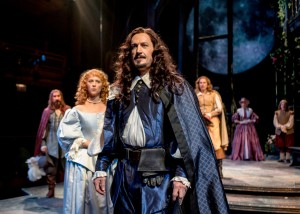 Currently magnificently if not passionately staged by Penny Metropulos in Navy Pier’s Courtyard Stage of Chicago Shakespeare Theater, Rostand’s historical romance sweeps as widely as stagecraft allows: Kevin Depinet’s wooden Gothic arches and balconies frame the action with storybook precision. At its heart lies the eloquent but not altogether rhapsodic trio: Henry Groener is technically flawless and often persuasive as Cyrano, but Nick Dillenburg’s handsomely clueless Christian offers reflexive adoration for Julie Jesneck’s Dresden-china Roxane that is too often left to our imagination. Jesneck, as with Groener, goes through every correct pace, but both find it difficult to command center stage amid the swirl of so much gorgeous scenery and stage traffic (or rather, crowd control). Groener had no such problem in the title role of C.S.T.’s The Madness of King George.
Currently magnificently if not passionately staged by Penny Metropulos in Navy Pier’s Courtyard Stage of Chicago Shakespeare Theater, Rostand’s historical romance sweeps as widely as stagecraft allows: Kevin Depinet’s wooden Gothic arches and balconies frame the action with storybook precision. At its heart lies the eloquent but not altogether rhapsodic trio: Henry Groener is technically flawless and often persuasive as Cyrano, but Nick Dillenburg’s handsomely clueless Christian offers reflexive adoration for Julie Jesneck’s Dresden-china Roxane that is too often left to our imagination. Jesneck, as with Groener, goes through every correct pace, but both find it difficult to command center stage amid the swirl of so much gorgeous scenery and stage traffic (or rather, crowd control). Groener had no such problem in the title role of C.S.T.’s The Madness of King George.
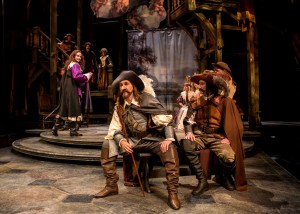 Superb character work comes from the always reliable Ross Lehman as the all-purpose pastry cook Ragueneau, Sean Fortunato as Cyrano’s supple confidant, Wendy Robie as Roxane’s foxy companion, and Aloysius Gigl is a dignified villain as the Count de Guiche, Cyrano’s aristocratic rival and military superior. (Curiously, the production omits Raguneau’s all-important wagon in the fourth act–where Christian and Roxane finally consummate their marriage before the Siege of Arras.) The ensemble of Gascon cadets, patrons of the Theatre Beaujolais, pastry-shop patrons, and the nuns in Roxane’s convent acquit themselves with all the splendor of a sumptuous budget.
Superb character work comes from the always reliable Ross Lehman as the all-purpose pastry cook Ragueneau, Sean Fortunato as Cyrano’s supple confidant, Wendy Robie as Roxane’s foxy companion, and Aloysius Gigl is a dignified villain as the Count de Guiche, Cyrano’s aristocratic rival and military superior. (Curiously, the production omits Raguneau’s all-important wagon in the fourth act–where Christian and Roxane finally consummate their marriage before the Siege of Arras.) The ensemble of Gascon cadets, patrons of the Theatre Beaujolais, pastry-shop patrons, and the nuns in Roxane’s convent acquit themselves with all the splendor of a sumptuous budget.
photos by Liz Lauren
Cyrano de Bergerac
Chicago Shakespeare’s Courtyard Theater
ends on November 10, 2013
for tickets, call 312-595-5600 or visit Chicago Shakes
for more shows, visit Theatre in Chicago
